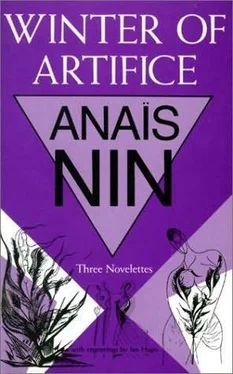Anaïs Nin - The Winter of Artifice
Здесь есть возможность читать онлайн «Anaïs Nin - The Winter of Artifice» весь текст электронной книги совершенно бесплатно (целиком полную версию без сокращений). В некоторых случаях можно слушать аудио, скачать через торрент в формате fb2 и присутствует краткое содержание. Год выпуска: 2007, Издательство: Sky Blue Press, Жанр: Классическая проза, на английском языке. Описание произведения, (предисловие) а так же отзывы посетителей доступны на портале библиотеки ЛибКат.
- Название:The Winter of Artifice
- Автор:
- Издательство:Sky Blue Press
- Жанр:
- Год:2007
- ISBN:нет данных
- Рейтинг книги:4 / 5. Голосов: 1
-
Избранное:Добавить в избранное
- Отзывы:
-
Ваша оценка:
- 80
- 1
- 2
- 3
- 4
- 5
The Winter of Artifice: краткое содержание, описание и аннотация
Предлагаем к чтению аннотацию, описание, краткое содержание или предисловие (зависит от того, что написал сам автор книги «The Winter of Artifice»). Если вы не нашли необходимую информацию о книге — напишите в комментариях, мы постараемся отыскать её.
“A handful of perfectly fold fables, and prose which is so daringly elaborate, so accurately timed… using words as magnificently colorful, evocative and imagist as any plastic combination on canvas but as mysteriously idiosyncratic as any abstract.”
—
The Winter of Artifice — читать онлайн бесплатно полную книгу (весь текст) целиком
Ниже представлен текст книги, разбитый по страницам. Система сохранения места последней прочитанной страницы, позволяет с удобством читать онлайн бесплатно книгу «The Winter of Artifice», без необходимости каждый раз заново искать на чём Вы остановились. Поставьте закладку, и сможете в любой момент перейти на страницу, на которой закончили чтение.
Интервал:
Закладка:
I felt my wrist watch pulsing against my pulse, fast, fast, fast. The hours pulsing against my life, pulsing too quickly.
“I don’t want to leave you.”
The room was black. Hans was asleep in my arms, heavily asleep now. I heard the accordeon. It was Sunday night in Billancourt. The music made my veins swell, as if it were hot liquid passing through me. He lay asleep in my arms. And all this would vanish at Johanna’s coming. No duration. Like a Sunday holiday. It was like a holiday, with the accordeon playing, and the Sunday crowd laughing and shouting. I must not be sad because it was only a holiday. To-day I was welded to him, and to-morrow Johanna would be back.
What baffled me was that it should be possible for Hans to lie so close, knowing only what I wished to tell him. That there should be no traces on my body of the lapses in my courage.
My thoughts, like elastics, were stretched to their thinnest meaning. I was waiting for him to awake. He would push everything into movement again. He was all movement. He lived by gusts.
It was the gusts I enjoyed. I might sit for a whole day afterwards and sail my lingering mind like a slow river boat down the feelings he had dispersed with prodigality. In my mind, like a sanctuary, I gathered his passions, his drunkenness, his speeches, his honesty, his jubilance, his pranks, his contrariness, his naturalness…
Johanna and I were not so honest… never so honest…
“Hans, wake up,” I said softly, “wake up! I have something to say for your book. Johanna and I are hypocrites, hypocrites. We always want to embellish ourselves, to make our motives appear sublime.”
“Why did she lie so much?”
“For many reasons. Because she loved you and could not bear to hurt you. Or because she loved herself and could not bear to spoil her own image of herself. Or because she feared not to be loved as she was. Or because she wanted to improve on life, because she had read too many books and they went to her head. (I too was once top heavy. When I was asked where I came from I could only answer: books!) Or because you wrote certain things about her and she wanted to live up to them. (The other day when you called me a chameleon, I immediately thought of ways to become more so, because the idea interested me). She did deprive you of so much, by her lies. Everything she gave you was false. I want to give you back Johanna washed of all pretenses. I can do it. Ask me questions. Ask me…”
“Why don’t you lie to me?”
“Because we have other things to do together. We don’t have much time to play games—to invent. I sometimes regret the fact that we don’t have time to play, that you will never see me mysterious, provoking, elusive. In a way, I have been cheated of something, by coming just when you needed peace in which to work. Johanna could lie, could be noisy, dramatic, could run away, could come back, could torture you, make you laugh, deceive or make you drunk, I am only allowed to sit still, but I don’t mind. Look at to-day, we have your new pages to read, and the next ones to dream over. I have to give you a different kind of mystery. There’s nothing to throw at each other, for the moment, but questions and answers. What was the meaning of this or that event? Do you think I have done justice to it?”
“I always suspected that when Johanna gave me so many lies it was because she had nothing else to give but mystery, but fiction. Behind the mystery there was nothing.”
“That we must find out together. Let’s begin now.”
“There’s plenty of time, plenty of time for everything,” said Hans. He put his hand on my shoulder. “Let’s go out and have a juicy steak, with plenty of onions on it, and red wine. And let’s send Johanna a cable and tell her I don’t want her any more. I know now I don’t want her to come back, that I need you terribly. If when she comes back I act exactly as she wants me to act you must not feel that I disappoint you or fail you. Her rages terrify me. What I feel with you which I don’t feel with Johanna is that beyond love we are friends. Johanna and I are not friends. You are the only woman I can be faithful to in my way. Let’s not go out. There’s some stuff in the kitchen. I feel like getting to work right now. I want to show you some notes I made.”
“Sit down then. Let me cook the dinner. Let me play at being the wife of a genius.”
He smiled. “It’s funny to see you going to the kitchen in your stately rose dress.”
As I sat there looking intently at the cups and saucers which did not match, at the liqueur glass made out of an egg holder, at the chipped plates, at the stains on the tablecloth and the mend in the corner of it, I felt that I loved this meal more than all those I ate elsewhere because it showed the traces of living. Hans made no effort to disguise the imprints of living; each object was a proof of life’s using, wearing, breaking and staining of things. Everywhere else there had been an effort made to erase the damage made by life, as there had been an effort made to escape its stains, its destruction, and I saw in him and at this table, the bare, naked life, the debris of it, the ravages small or large, like the greyness of his hair, his fatigue, his heavy note books, all as rich in the acceptance of nature as the rich soup steaming hotly in the pan it was cooked in; everything without the disguise which diluted its colors.
The ancient garden slumbered like an old man in the sun. The trees swayed and the breezes sang. The books lay about on the grass.
“According to the Chinese,” said Hans, “there was a realm between heaven and earth… this is it.”
I cooked for him. Suddenly I loved cooking because it was for Hans. I cooked richly and the odors of pungent flavors seeped through the house. I loved to see him eat, and to eat with him. I could see the food turning to rich blood in him. Red meat, buttered and peppered food, and red wine. The alchemy of his joy giving a high flavor to every moment. The miracle of his fieriness converting food and sleep and rest into joy.
Desire coursing. Dreams of semen. Earth. Semen. Incandescence. A furnace of caresses and of talk. I felt heavy and burnt. Not bodies but flames, and added to the fuel the flame of our talk, our moods. I was crying and laughing with joy. Solitude. Summer heat. Tornadoes and exquisite calms.
The night. Books. “Djuna. I want to keep you under lock and key. To hide you. You are too rare. When I lie here with you I am no longer restless. You have a gift for illusion. It’s always a fairy tale with you. Even when you are cooking, even when you sewed my curtains, even when you cure my stomach aches, you are the Princess. With you I feel whole and ecstatic.”
And he lay still, lulled by my softness, resting on my love, the core of bitterness and fury in him lulled.
Suddenly, he leaped up with a whip-like alacrity and a smashing, overwhelming vigor and exuberance, like a man who had suddenly been electrified. He began to talk about his childhood, about Johanna, about his life in the streets, about the women he had loved and ditched, and the women who had ditched and “bitched” him, as he put it. He seemed to remember everything at once, as though it were a ball inside him which unravelled of itself, and as it unravelled made new balls which he would unravel again another day. Truth, lies, humor, fantasy, dreams, a hodge-podge which however fantastic, however wild or inaccurate, rang out with a fierce sincerity, with a gong-like reality that shattered the feeble realities of fact or dream even. Had he actually done all these things he was relating to me with such kaleidoscopic fury and passion? Had he really killed a boy with a snow ball? Had he really struck his first wife down brutally, with his bare fist, when she was with child? Had he really butted his head against a wall in sudden anger and knocked himself unconscious, as he said—because the woman he loved had rejected him? Had he really taken abortions and thrown them off the ferry-boat in order “to pick up a little extra change”? Whether he had or not really didn’t matter. I knew that he was capable of doing the thousand and one mad, rash, crazy, contradictory things he talked about.
Читать дальшеИнтервал:
Закладка:
Похожие книги на «The Winter of Artifice»
Представляем Вашему вниманию похожие книги на «The Winter of Artifice» списком для выбора. Мы отобрали схожую по названию и смыслу литературу в надежде предоставить читателям больше вариантов отыскать новые, интересные, ещё непрочитанные произведения.
Обсуждение, отзывы о книге «The Winter of Artifice» и просто собственные мнения читателей. Оставьте ваши комментарии, напишите, что Вы думаете о произведении, его смысле или главных героях. Укажите что конкретно понравилось, а что нет, и почему Вы так считаете.











